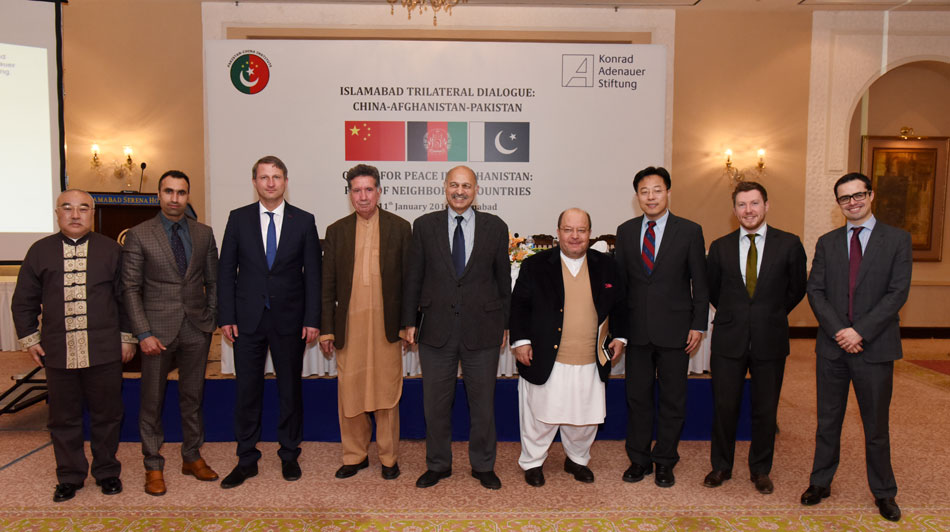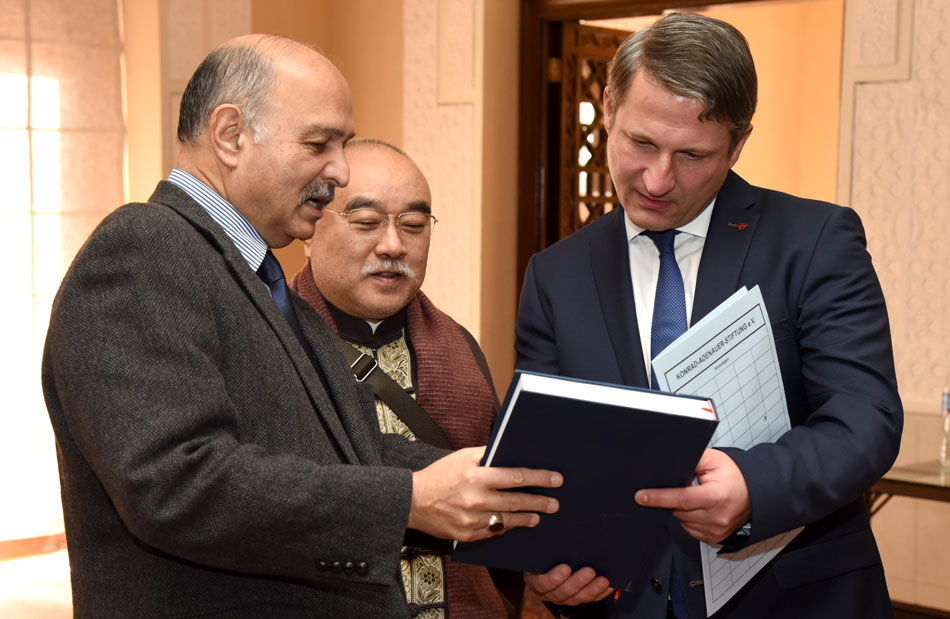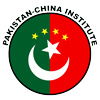3rd China-Afghanistan-Pakistan Trilateral Dialogue
Date : 22-01-2016
 |
The Pakistan-China Institute, in collaboration with Konrad Adenauer Stiftung, held the Third China-Afghanistan-Pakistan Trilateral Dialogue at the Serena Hotel in Islamabad on 11th January 2016. PCI launched the initiative in 2013, with the first dialogue in Beijing, because it felt that the three neighbors, China, Afghanistan and Pakistan, have their interests as well as regional objectives intertwined with each other and their destinies are interlinked by a common heritage, geography and a mutuality of interest. Therefore, there was a strong need to have a platform where the top strata of the government, intellectuals, and ordinary citizens from these countries interact to debate common problems and propose solutions.
The Third Dialogue in the series focused on the continuing Afghan Peace Process with a special emphasis on the role of China and Pakistan. In his Welcome Address, Senator Mushahid Hussain, Chairman of the Parliamentary Committee on CPEC, and Chairman of the Pakistan-China Institute, underlined that the three countries are working closely together and there are three areas which are very important points of convergence between China, Afghanistan and Pakistan. The first out of these is the Afghan Peace Process because peace in these two countries is inextricably intertwined; if there is peace in Afghanistan, it has implications for Pakistan, and when there is peace in Pakistan, Afghanistan also benefits positively. Secondly, he explained further, these countries face the common enemy of terrorism and extremism, for which the they are already in close cooperation, and thus, it constitutes as another common endeavour. The third element in the mutuality of interest, he highlighted, is the China-Pakistan Economic Corridor where the three neighbouring countries are part of regional economic cooperation and connectivity.

Appreciating the role of Mr. Sartaj Aziz, Advisor to Prime Minister on Foreign Affairs, who was also the Keynote Speaker at the Dialogue, Senator Mushahid Hussain remarked that Mr. Aziz has played a pivotal role in driving the shift in Pakistan’s foreign policy and the country is now moving towards regional cooperation with the inception of the Iran-Pakistan Gas Pipeline, the Turkmenistan-Afghanistan-Pakistan-India Pipeline and the opening up with Russia, among other regional initiatives. Senator Hussain also mentioned PCI’s research initiative published in collaboration with KAS and titled ‘Corridors, Culture and Connectivity’, which aims to produce policy research on socio-economic, energy and infrastructural development, as well as cultural linkages and strategic connectivity across the Asian region.
While addressing the inaugural session of the 3rd China-Afghanistan-Pakistan Trilateral Dialogue, Mr. Sartaj Aziz commended the role that Pakistan-China Institute and Konrad Adenauer Stiftung have played in organizing the dialogue and providing the opportunity for brainstorming on the pursuit of enduring peace and stability in Afghanistan through a collective approach. “The topic under discussion is one of crucial importance to Pakistan’s Foreign Policy, and I am confident that your deliberations would be constructive and meaningful,” added Mr. Aziz. Sharing his thoughts on the matter, he opined that that the prolonged conflict throughout the last thirty-five years, has not only caused immense suffering for people form both the countries but has also prevented them from realizing their full development potential. “Pakistan desires sustainable peace and stability in Afghanistan, as a peaceful Afghanistan would be the harbinger of peace and stability in the entire region,” he said. “Pakistan will continue its endeavors for strengthening bilateral engagement with Afghanistan through deepening interaction in diverse fields and also by facilitating an intra-Afghan reconciliation process aimed at bringing lasting peace to the country,” he vowed. Mr. Aziz was also of the view that terrorism is a major regional and global threat; while Pakistan has suffered immense human and economic loss due to the menace but it has only strengthened our countrymen’s resolve to win this fight. He reiterated that close cooperation in bilateral and regional levels is vital to eliminate this scourge and realize our shared goal of economic integration and connectivity.
Professor Li Xiguang, eminent scholar of Tsinghua University, who was also part of the distinguished Inaugural panel at the Dialogue, discussed the development of the China-Pakistan Economic Corridor in relation to the Afghan Peace Process. Sayed Hamed Gailani, Deputy Leader of the National Islamic Front of Afghanistan, while sharing his views on the way forward in relation to Afghanistan, said that mere talks would not get us anywhere and what we need in this juncture is “sound address”. “For the peace mechanism to be handled properly, it must be Afghan owned and Afghan led,” he stressed. Addressing the prestigious gathering, Mr. Ronny Heine, Resident Representative of Konrad Adenauer Stiftung, highlighted the importance of the topic under debate and stressed that the cooperation between China-Afghanistan and Pakistan could not only play an effective role in promoting mutual understanding, but it is also vital to bring peace and stability to the region.

Mr. Andrew Small, author of the ‘China-Pakistan Axis: Asia’s New Geopolitics’ and Fellow at the German Marshall Fund of the United States shed light on the shifts in the external environment of Afghanistan that have improved the conditions for peace, which included both global as well as regional countries. He emphasized that China is now more seriously involved in the reconciliation process and is deploying all political resources it has at its disposal. “China is the only relevant party that all stakeholders trust; and China’s intentions and motivations in Afghanistan are seen as largely neutral and genuinely focused on stability,” he added. Given the trust deficit in the region, having one powerful actor that can bridge the trust gap really makes a difference, he opined. Sharing an international perspective, Dr. Rafaello Pantucci, Director of International Security Studies, Royal United Services Institute London, presented insights on his institute’s research that looked at what outside countries could be doing to help develop Afghanistan and stabilise the war-torn country. Praising China’s role in the region Dr. Pantucci commented, “It is beneficial to see China playing a positive role in helping to develop infrastructure in the part of the world that really needs it.” However, in relation to Afghanistan, he had some reservations and emphasized that Beijing should lay out a clearer plan as to where Afghanistan fits within the One Belt, One Road Initiative. Sharing his recommendation for the actors in the region, Dr. Pantucci also highlighted that since countries like China and Pakistan are permanently affected with the situation in Afghanistan, so they would have to be the ones who make the greatest investment in understanding and ensuring that the Afghan National Security Force (ANSF) is an effective force capable of maintaining security within its own borders as well as the country as a whole. He also added that the neighbouring countries can help develop small and medium sized enterprises in Afghanistan that would enable it to stabilise its economy in the long run. Also part of the panel was Mr. Intizar Khadim, Former Senior Advisor of Strategic Communication to the High Peace Council, Afghanistan. Mr. Khadim stressed on the need of people-to-people contacts as well as building trust among all neighbours in order to ensure lasting peace. He emphasized that Afghanistan would have to take the responsibility of rebuilding the country on its own shoulders.
The concluding session, which discussed prospects for peace in Afghanistan, was moderated by Senator Afrasiab Khattak. Mr. Zhao Lijian, Deputy Head of Mission from the Chinese Embassy in Islamabad, was also present on the occasion on behalf of H.E. Ambassador Sun Weidong of China, and highlighted that Afghanistan would be supported to participate in the regional cooperation, connectivity and economic integration. “China warmly welcomes Afghanistan and other countries along the Silk Road to participate in the larger One Belt, One Road Initiative,” he added. Senator Khattak while summing up the debate quoted Iqbal and said that Afghanistan is the heart of Asia; and if Afghanistan is stable and peaceful, the whole of Asia would develop, and if it is suffering, it will impact the whole region in a negative manner. He also appreciated the role of PCI and KAS in arranging the dialogue as it is important for think tanks to lead policy research and then share it among all relevant stakeholders.

